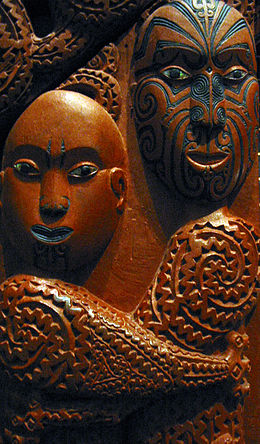AY Honors/Māori Lore/Answer Key
In Māori mythology, the primal couple Rangi and Papa (or Ranginui and Papatuanuku) appear in a creation myth explaining the origin of the world.&
Link title==Union and separation== Ranginuicb;hkfgbokjhfegksdoogsdhfog fuk you and Papatuanuku are the primordial parents, the sky father and the earth mother, who lie locked together in a tight embrace. They have many children&, all of which are male, who are forced to live in the cramped darkness between them.& These children grow and discuss amongst themselves what it would be like to live in the light. Tūmatauenga, the fiercest of the children, proposes that the best solution to their predicament is to kill their parents (Grey 1956:2).
But his brother Tāne (or Tāne-mahuta) disagrees, suggesting that it is better to push them apart, to let Rangi be as a stranger to them in the sky above, while Papa will remain below to nurture them. The others put their plans into action: Rongo, the god of cultivated food tries to push his parents apart, then Tangaroa the god of the sea and his sibling Haumia-tiketike, the god of wild food, join him. In spite of their joint efforts, Rangi and Papa remain close together in their loving embrace. After many attempts, Tāne, god of forests and birds, forces his parents apart. Instead of standing upright and pushing with his hands as his brothers have done, he lies on his back and pushes with his strong legs. Stretching every sinew, Tāne pushes and pushes until with cries of grief and surprise, Ranginui and Papatuanuku are prised apart (Grey 1956:2-3, Biggs 1966:448).&
Yearning
Tāne searched for heavenly bodies as lights so that his father would be appropriately dressed. He obtained the stars and threw them up, along with the moon and the sun. At last Rangi looked handsome (Orbell 1998:145). Rangi and Papa continue to grieve for each other to this day. Ranginui's tears fall towards Papatuanuku to show how much he loves her. Sometimes Papatuanuku heaves and strains and almost breaks herself apart to reach her beloved partner again but it is to no avail. When mist rises from the forests, these are Papatuanuku's sighs as the warmth of her body yearns for Ranginui and continues to nurture mankind (Grey 1956:11).
Names and epithets
Rangi:
- Rangi (Sky)
- Raki (Sky) in the South Island
- Ranginui (Great Sky)
- Rangi-pōtiki (Rangi the lastborn): possibly another name of Rangi, or a closely allied deity
Papa:
- Papa (Earth)
- Papatuanuku (Earth spread out)
External links
- Grey's Polynesian Mythology, first edition (1854).
- Samuel K. Parker, Dialectics of Power in the Maori Creation Myth in Pacific Studies, Vol 10 n°3, july 1987
- Tikao, T. T. (1939). Tikao talks: Traditions and tales told by Teone Taare Tikao to Herries Beattie (pp. 23-50). Wellington, New Zealand: A.H. and A.W. Reed.
- E.R. Tregear, Maori-Polynesian Comparative Dictionary (Lyon and Blair: Lambton Quay), 1891.
Notes
- ↑ This article is based largely on the writings of a Te Arawa chief, Wiremu Maihi Te Rangikāheke, who is the author of much of the material in George Grey’s Nga Mahi a nga Tupuna (Grey 1971), originally published in 1854 and later translated into English as Polynesian Mythology (Grey 1956). It should be understood that the version presented here represents just one Māori creation myth among many variants
- ↑ The specific number of children they have depends on who you ask but generally the number lies between 70 and 77. Whether such a high number actually occurs in one early text is another matter for investigation.
- ↑ Their children include, depending on the version: Tāne, Tangaroa, Tāwhirimātea, Rongo or (Rongo-mā-tāne), Haumia-tiketike, Tūmatauenga and Rehua. The youngest is Ruaumoko, who has never been born and remains inside his mother's womb. His movements cause earthquakes.
- ↑ Traditions of the Taranaki region, however, assign this separating role to Tangaroa, god of the sea (Smith 1993:1-2).

